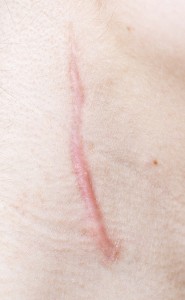 Scarring is a common concern for patients who undergo surgery. No matter how you care for your surgical wound, it can still end up with some form of scarring. It doesn’t matter if the surgery is minor or major nor if the incision is deep or shallow. Add to that the fact that some patients are more prone to scarring than others and that some body parts develop scars worse than other parts. Some scars may even continue to grow long after the healing process is complete.
Scarring is a common concern for patients who undergo surgery. No matter how you care for your surgical wound, it can still end up with some form of scarring. It doesn’t matter if the surgery is minor or major nor if the incision is deep or shallow. Add to that the fact that some patients are more prone to scarring than others and that some body parts develop scars worse than other parts. Some scars may even continue to grow long after the healing process is complete.
In a world where smooth skin is one of the measures of physical beauty, having an unsightly scar can be truly distressing especially on areas where they can easily be seen. Fortunately, taking care of surgical scars is not difficult at all thanks to these tips on how to take care of them.
Tip #1
Protection from sun exposure, particularly during the first year after surgery, is extremely important to prevent scars from getting worse. UV rays from the sun cause scars to darken and get thicker which makes them even more obvious. To prevent this from happening, dermatologists recommend using sun protection products that contain titanium dioxide or zinc. These agents block the effects of UV rays of the skin. Find products with SPF (sun protection factor) of at least 30. Tanning beds must also be avoided as they practically produce the same UV rays as the sun.
Tip #2
Keep the scar hydrated by applying moisturizing creams or gels. Don’t let it dry out. Gently massage the moisturizer on the scar to stimulate blood flow in the area. Use a hypoallergenic product and find ones that contain vitamin E and shea butter. Vitamin E is an antioxidant which also promotes faster healing while shea butter is natural oil that has been effectively used as a skin softener and moisturizer for hundreds of years. While shea butter is incorporated in many skin products, dermatologists recommend using the pure form and rubbing it directly on the scar for a much faster effect.
Tip #3
Aside from commercial moisturizers, there are also some home remedies that you can employ to keep your scars hydrated. These include raw honey, St. Johns Wort and aloe vera. Raw honey is one of the most frequently used traditional home remedies for many skin-related concerns including scars. It contains enzymes which act as an antiseptic and anti-inflammatory healing agent. Honey can be applied directly on the skin.
St. Johns Wort is a powerful antidepressant which also produces effective healing results on the skin. It induces collagen formation and facilitates faster and healthier wound healing. According to studies, patients who have used St. Johns Wort on their surgical wounds experienced faster healing, less discomfort and flatter and less discolored scars.
Lastly, aloe vera is another herbal remedy widely popular for its healing and anti-inflammatory properties. Its ability to penetrate deep layers of the skin promotes faster repair of damaged cells and increased amount of collagen production. When applied on scars, aloe vera extract significantly reduces the redness and swelling of scars.
Tip #4
Putting silicone gel sheets on the scar may help it fade away over time. These sheets are particularly useful for keeping scars flat. Some companies that produce silicone sheets also claim that these sheets can combat redness, swelling and itching of both new and old scars. Silicone gel sheets are available at drugstores and you can also buy them from a dermatologist. This product produces noticeable improvements after three months of regular use.
Tip #5
If you are a smoker, it is strongly advised that you stop the habit immediately. Smoking, or more specifically the nicotine in cigarettes and tobacco, causes blood vessels to narrow. This leads to decreased delivery of blood to the site of the scar. Blood contains oxygen which speeds up healing. If there isn’t enough oxygen, healing is compromised and slowed down. A lack of oxygen may lead to a breakdown of tissues that can cause the creation of an open wound that will take weeks, or even months, to completely heal.
While surgical scars are a not-so-attractive reminder of the surgery that you underwent, it is the body’s way of protecting us from damage. While scars tend to fade away over time without any intervention, the tips given above will help speed up healing and minimize the appearance of the scar a bit faster. The tips discussed in this article are a rough guide and should not replace any advice given by your surgeon. Also, there are other tips and techniques out there that will help you. The overall effectiveness of these techniques is still largely dependent on the individual’s physiology and his or her efforts in following the advice of their doctor.
